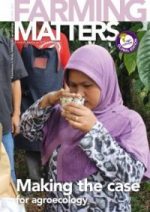Farmer Madelyn Álvarez Díaz explains how the agroecological movement in Cuba has grown from aiming to improve soils to striving for farmers’ political self-determination.

“My name is Madelyn Álvarez Díaz and I am a peasant. I also coordinate the agroecological peasant-to-peasant movement in the Cienfuegos province, in Central Cuba. On our family farm, we use agroecological methods to cultivate and also to improve our soils. Before we got the land, it had been a dairy farm and the soil was very rocky. We have managed to improve our soil by mulching, with living fences, and by using effective microorganisms. Nowadays, our soil is rich and of good quality. Good quality soil means that the food we produce is healthy and nutritious. When you visit conventional farms, you see entire fields dedicated to a single crop. We agroecological farmers don’t think this way. We think of diversification and the need to produce year-round. Therefore, we grow a little bit of everything.
To me, any farmer who tries to improve her soils and her quality of life, and thinks of ways to care for her plants and the environment, is an agroecological farmer. My work as a promoter of agroecology starts when I meet a farmer who would like to farm using agroecological principles. We work together, and always start by identifying which agroecological practices they already use.
In the past, Cuban farmers practiced agroecology simply to improve their soils and to help one another. In recent years, as the movement has grown, these farmers have become conscious of the work they do and have started to collectively determine their own political processes. Self-reflection and self-determination are impacts of agroecology. Personally, I have also experienced this impact. Peasants are the most modest and natural people you will ever meet. I feel proud of being one and doing my bit by caring for the environment and helping solve humanity’s current problems. I am in love with the work that I do, not everyone can say that about their work.”
Interview by Georges Félix, PhD candidate at Wageningen University and Diana Quiroz, editor at ILEIA.

